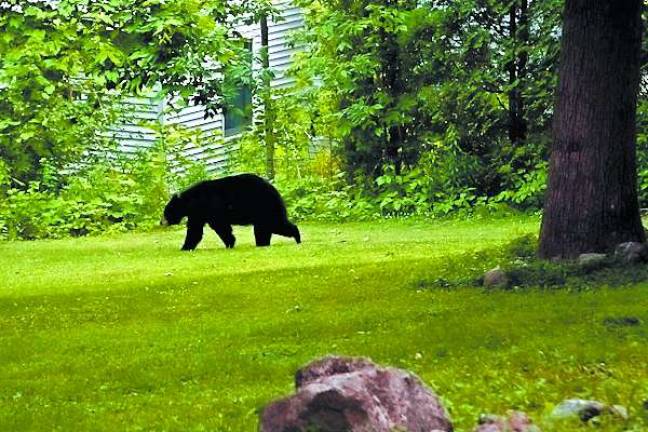DEP searches for answers in bear attack

BY EMILY KAHOUD
WEST MILFORD — Less than a week before a hiker, 22-year-old Darsh Patel, was fatally injured by a black bear attack in West Milford's Apshawa Preserve, the New Jersey Department of Environmental Protection's Division of Fish and Wildlife had updated its website, "Know the Bear Facts - Black Bears in New Jersey," instructing people on how to avoid conflicts with New Jersey's black bear population.
Although bear encounters are ubiquitous in forested parts of New Jersey, this tragic incident is an outlier; there are no known fatal attacks occurring in the past 100 years, according to West Milford Police Chief Timothy Storbeck.
Patel and his four friends, all from Edison, had been hiking in the Apshawa Preserve on Sunday afternoon when a black bear followed them. They attempted to escape the bear by fleeing, and at some point had become separated, they told police. Eventually four of the five hikers were able to find one another, and contacted the West Milford Police Department upon discovering that one of the friends remained missing. The West Milford Search and Rescue was deployed and, according to Storbeck, the victim was found approximately 35 yards from where a black bear had been circling. Because the bear would not leave the body in its display of typical predatory behavior, he said, officers shot it dead with a shotgun.
Bear population is expanding
Over the past two decades, populations of the American black bear have been growing and expanding into new geographic territories, according to the International Union for Conservation of Nature and Natural Resources. In New Jersey, black bears have been increasingly encountered outside of the northwest part of the state and have now been sighted in all 21 counties of New Jersey. Yet, according to West Milford Mayor Bettina Bieri, as conservation methods have reduced the Northern New Jersey bear population and public education has led to better co-existence, human-bear encounters have actually declined in recent years.
American black bears are omnivores - they are known to eat everything from nuts, fruits, and roots, to fish, small mammals, and garbage — and they are rarely known to attack humans. But an acute sense of caution — a prerequisite for the survival of our ancestors - has not yet evolved out of us. One violent incident of this nature is enough to instill trepidation in local hikers and nature enthusiasts, tainting a former peaceful pastime.
Why did this happen?
Officials at a press conference held at West Milford Township Hall on Monday afternoon said it is unclear why this 299-pound, 4-year-old black bear began tracking, and then fatally attacked the victim. This bear had not been tagged, a tactic utilized by the New Jersey Department of Environmental Protection to keep track of black bears having a history of aggression. However, encounters such as these are typically attributed to food shortages, and this year's vegetation has been "spotty to non-existent," with a particular deficit of acorns, explained Principal Biologist and leader of the New Jersey Division of Fish and Wildlife's Black Bear Project, Kelcey Burguess.
The question of black bear aggression related to disease remains disputed. Carnivorous mammals are a known host for the rabies virus, which presents as two forms, one of which has been termed the “furious form” for its extreme aggression. Yet bears are one of the least concerning hosts. Others have speculated that truculence in bears may be influenced by infection with the parasite Trichinella, which progressively invades essential organs including the brain, and may lead to abnormal and hostile behavior.
Dr. Shannon Swist, veterinary pathologist and Pathology Section head of the New Jersey Animal Health Diagnostic Laboratory will be performing an investigative necropsy on the bear to determine whether it was diseased. Yet Burguess cites the bear's motive as "most likely predatory," as its behavior was consistent with that of a predator safeguarding its food.
In the face of this tragedy, the warning of the NJDEP Division of Fish and Wildlife, “Preventing problems with black bears is everyone’s responsibility!” must be heeded, officials said, as the “panhandling” and inadvertent feeding of the bears via unsecured garbage cans creates a dependence on human provisions. And grave consequences can arise once this reliance on human food clashes with a failure to provide.
If you know something
The West Milford Police Department is actively seeking information from anyone who may have been hiking in the Apshawa Preserve on Sunday, Sept. 21,4. Specifically, police are seeking the identity of two hikers that came into contact with a the group of five from Edison that was hiking in the Apshawa Preserve. The identity of the additional two hikers will assist the ongoing investigation, police said. Anyone with information is asked to contact Detective Sergeant Steven Singerline of the West Milford Police Department at 973-728-2803.